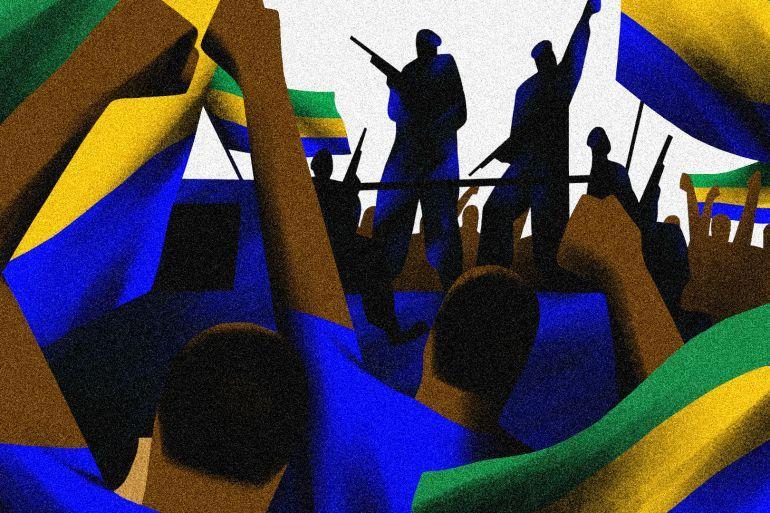Africa-Press – Mauritius. In August, when a group of Gabonese military officers deposed President Ali Bongo, whose family had ruled the country for nearly six decades, many ordinary citizens came out on the streets to celebrate.
When Bongo put out a call for the international community to “make noise” against the coup, it quickly turned into a meme mocking him, with dancers and content creators ridiculing his desire to stay in power.
Neither the military putsch in Gabon nor the street response to it are unique. Since 2020, there have been nine coups in West Africa, Central Africa and the Sahel region.
Mali opened the floodgates three years ago when the army staged a mutiny and subsequently undertook a coup led by Colonel Assimi Goita – who then followed up with another coup against an interim administration in May 2021.
Four months later, in September, Guinea followed with a military coup against President Alpha Conde. Sudan’s civilian-military transitional government was overthrown in October 2021.
Earlier that year, in April, Chad’s army seized power after President Idriss Deby was killed on the battlefield while visiting troops fighting rebels in the north. Burkina Faso joined this pattern of collapsing governments, with two military coups in 2022.
Then, on July 26, 2023, the presidential guard in uranium-rich Niger overthrew democratically elected President Mohamed Bazoum, before the Gabon coup a few weeks later.
Since the beginning of last year, The Gambia, Guinea-Bissau, and Sao Tome and Principe have all witnessed failed coup attempts. In many – though not all – of these instances, these uprisings and coups appear to have had significant popular support from civilians.
So, are people fed up with civilian-led governments even though they are often at least notionally democratic? Is Africa on the cusp of more coups? And how much of a factor are international players, whether former colonial powers like France or mercenaries from Russia, or regional groupings like the Economic Community of West African States (ECOWAS)?
The short answer: Weak democratic processes have often failed nations in Francophone West Africa and the Sahel in particular, resulting in deepening inequality, corrupt administrations and fragile ethnic and cultural accords, according to experts.
Those conditions, in turn, attract paternalistic superpowers that are keen to extend their influence. This combination of economic, political and social challenges makes the region especially vulnerable to coups.
Where’s the democratic dividend?
It’s not just images and videos of people celebrating coups – hard data suggests a wide gap between the lived experience of democracy in large parts of the continent and the hopes people have pinned on the system of governance.
A vast majority of people from 34 African countries polled by the independent political survey outfit Afrobarometer in September 2022 said they believed regular, honest and open elections were the best guarantor of their interests.
But only 44 percent said elections help voters remove leaders who don’t do what the people want. In 19 countries polled regularly since 2008-09, sentiments against elections as enablers of change have risen 6 percent.
Overall, support for elections has dropped in 26 of 30 African countries surveyed between 2011 and 2021. That includes Sudan, Mali, Burkina Faso and Niger – countries that have seen coups in the last three years.
But even in a country like South Africa, which has had consistent, largely free and fair elections since the end of apartheid, the support for elections has dropped 20 percentage points over the past decade.
According to Jonathan Asante-Otchere, a political analyst and lecturer at Ghana’s University of Cape Coast, citizens in many countries “are not seeing the dividends of democracy”.
That is a key reason, he said, “why the coup makers seem to enjoy that kind of support”, though Asante-Otchere also cautioned that it is unclear whether that support will last.
Corruption, human rights abuses, ethnocentrism and the militarisation of civilian politics – with armoured cars and boots on the ground used to quell civilian protests – have long blighted democratic experiments on the continent.
In Senegal and Ghana this year, soldiers have taken deadly measures in response to public unrest. Distrust of the political elite across the continent is growing, too.
And increasingly, that is showing up in the form of mounting apathy or active support for military rule. In a majority of the 28 countries surveyed between 2021 and 2022 by Afrobarometer, researchers found that most people would welcome a military government.
“What we are seeing is the product of dysfunctional institutions and the fact that democracy hasn’t delivered the expectations of the local population,” Mutaru Mumuni Muqthar, executive director at the Accra-based West Africa Centre for Counter-Extremism, told Al Jazeera.
At the heart of the discontent that has exploded into support for military rule are hard economic factors, suggested Daniel Amateye Anim, an economist.
In Mali and in Guinea, coup leaders cited corruption allegations that had long tainted the overthrown leaders of those nations to justify their actions. The cost of living has been soaring in many nations: Inflation was at a five-year high when Guinea’s Conde was removed from office in 2021.
“I think it’s largely because of the economic situations within the sub-region, especially in those countries,” Anim, of the Accra-based Policy Initiative of Economic Development Africa, told Al Jazeera.
“The reasons are a high cost of living and people not getting jobs but seeing their political elite living very well.”
For More News And Analysis About Mauritius Follow Africa-Press







